The Zimbabwe
Story
Die Simbabwe-Geschichte |
|
 |
|
| |
25.03.03
 |
Torture
in Zimbabwe
Folter in
Simbabwe
|
|
|
|
|
| |
Who is responsible for
organized violence and torture in Zimbabwe?
A P Reeler.
Former Director, Amani Trust.
Executive Committee Member, The International
Rehabilitation Council for Torture Victims.
31 January 2003
Since the beginning of the
Zimbabwe crisis in February 2000, an enormous number of
reports have been published on the gross human rights
violations that have been perpetrated upon the people of
Zimbabwe. The vast majority have come from within
Zimbabwe, and mostly from the Zimbabwe Human Rights NGO
Forum and its member organisations. There have also been
corroborating reports from highly respected international
human rights organizations: Amnesty International, the
International Rehabilitation Council for Torture Victims
(IRCT), Human Rights Watch, and Physicians for Human
Rights (Denmark). These latter reports have universally
corroborated the reports of their Zimbabwean counterparts.
These reports, taken together, paint a very grim picture
of the organized violence and torture that has afflicted
Zimbabwe since February 2000. They confirm that gross
human rights violations have become routine in Zimbabwe,
unrepudiated in general by the government, and certainly
do not show that there have been any credible attempts by
the government to prevent or stop these violations from
occurring. The reports overwhelmingly implicate
supporters of Zanu PF as the major perpetrators, as well
as showing an alarming degree of involvement by state
agents such as the police, the intelligence services,
and, to a lesser extent, the army.
Terrible things have been done, the former Chief Justice
of Zimbabwe, Anthony Gubbay, put it, and they continue to
be done. The evidence shows that all the following gross
human rights violations have been perpetrated on the
citizens of Zimbabwe, and especially the supporters of
the Movement for Democratic Change (MDC):
- Summary executions
- Extra-judicial killings
- Disappearances
- Torture
- Mass psychological torture
- Political rape
- Rape
- Illegal arrests
- Unlawful detentions
Click here to access
the complete document
|
|
| |
26.02.03
 |
UN
blames Mugabe for humanitarian crisis in
Zimbabwe
UN macht Mugabe für
Hunger-Krise in Simbabwe verantwortlich
|
|
|
| |
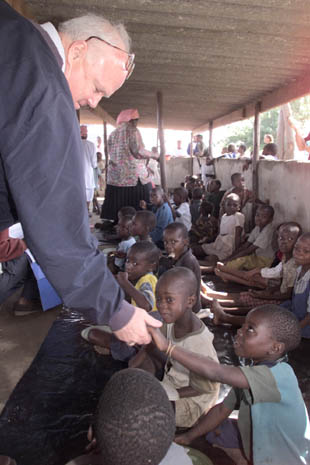 |
|
The
United Nations food agency has said that the
Zimbabwe Government is largely responsible for
the humanitarian crisis there.
The Zimbabwe crisis was "almost beyond
comprehension" and could easily have been
avoided, said James Morris, head of the World
Food Programme. He pointed to President Robert
Mugabe's land redistribution programme, which has
left thousands of normally productive farms lying
idle. Up to seven million people - half the
population - need food aid, donors say. The
government has also been accused of diverting
food aid away from opposition areas.

During his three-day trip to assess the
humanitarian response in Zimbabwe, Special Envoy
James Morris was driven to a child supplementary
feeding programme run by World Vision at
Dzivarasekwa - a densely populated suburb on the
outskirts of the capital Harare.
Mr Morris said that he had held six meetings with
Mr Mugabe in the past six months but had failed
to persuade him to alter his economic policies or
remove bureaucratic obstacles to food production
or aid distribution. |
|
| Der
Chef des UN-Welternährungsprogramms, der Amerikaner
James Morris, hat nach einem Besuch in Simbabwe und nach
Gesprächen mit Präsident Mugabe vor allem dessen
Politik der Landumverteilung für die humanitäre
Katastrophe im Lande verantwortlich gemacht. Viele einst
produktive Farmen lägen brach. |
 |
|
Starvation
maliciously engineered in Zimbabwe
By Ben Freeth
Friday, 17 January 2003 |
|
 |
|
| |
| |
09.01.03
| |
Half
of Zimbabwe’s wildlife wiped out by
poachers
Hälfte
aller wilden Tiere in Simbabwe
Opfer von Wilderern
|
|
|
| |
 Wildlife industry officials
estimate that at least 50 percent of Zimbabwe’s
wildlife has been wiped out by poachers in the
past two years, and that the country has lost
more than $6 billion in revenue. Most of the
poaching has been blamed on war veterans, who
began occupying white-owned farms in February
2000, and on beneficiaries of the government’s
controversial land reform programme. Disregard
for the country’s wildlife in the
implementation of the agrarian reforms has
resulted in the loss of not only wildlife but
vegetation and animal habitats that
conservationists say will only regenerate after
many years. Wildlife industry officials
estimate that at least 50 percent of Zimbabwe’s
wildlife has been wiped out by poachers in the
past two years, and that the country has lost
more than $6 billion in revenue. Most of the
poaching has been blamed on war veterans, who
began occupying white-owned farms in February
2000, and on beneficiaries of the government’s
controversial land reform programme. Disregard
for the country’s wildlife in the
implementation of the agrarian reforms has
resulted in the loss of not only wildlife but
vegetation and animal habitats that
conservationists say will only regenerate after
many years. |
|
50
Prozent aller wilden Tiere in Simbabwe sind nach
Schätzung von Experten während der vergangenen
beiden Jahren Wilderern zum Opfer gefallen. Das
entspricht einem Einkommensverlust von 6
Milliarden Zimbabwe-Dollar (ca. 4 Mio. €).
Verantwortlich dafür seien sogenannte
Kriegsveteranen, die Farmen besetzt hätten und
eine ungeordnete Politik der Umsiedlung.
Die Regierung habe jetzt vor, das Mangement von
wilden Tieren in ihre Landreform einzubeziehen. |
| |
|
|
| |
|
|
08.01.03
 |
Zimbabwe
runs short of banknotes
In
Simbabwe gehen die Geldscheine aus |
|
|
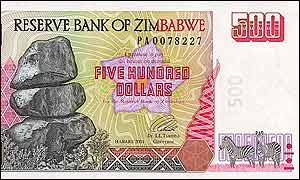 |
|
| |
| |
22.12.02
 |
Zimbabwe
fuel crisis looming over holiday season
Treibstoffmangel
überschattet
Feiertage in Simbabwe
|
|
|
| |
Zimbabwe's fuel crisis
looked set to spill into the Christmas holiday
season, further dampening the mood of a nation
grappling with its worst economic crisis in
decades. A two-week fuel shortage has nearly
paralysed public transport and left motorists
waiting in long fuel queues.
Ein
Höhepunkt der Treibstoffkrise wird in Simbabwe
zum Jahresende erwartet, womit ein Zusammenbruch
der bereits stark angeschlagenen Wirtschaft nach
dem Jahreswechsel absehbar ist.
 |
|

 |
|
| |
| |
29.08.02
 |
Zimbabwean
radio building blown up
Simbabwe-Radiostation in die Luft gejagt
|
|
|
| |
A security guard at the
offices of 'Voice of the People', which records
educational and current affairs radio programmes
and news bulletins, said that he was held at
gunpoint by one man while two others smashed
windows and threw two explosive devices inside.
No one was hurt, but what experts said was a
professional incendiary demolition left only the
walls of the ten-room building standing. “Everything
is destroyed,” Sarah Chiumbu, treasurer of
the Voice of the People Communication Trust, said.
“Our computers, all our recording equipment,
files, tapes.” Since the station started
broadcasting a little more than two years ago, it
has sidestepped a government ban on independent
radio stations by having its programmes beamed
through transmitters of Radio Netherlands based
on Madagascar.
 |
|

 |
|
Listen
to a feature about Voice of the People as
broadcast on
Media
Network
3 August 2000 (8'40") |
| |
|
|
 |
|
Listen
to Abel
Mutsakani,
Secretary General of
the Zimbabwe Union of Journalists,
talking
to Newsline's Josh Maiyo
30 August 2002 (4'07') |
|
|
In
einem Wohnviertel der Hauptstadt Harare ist in
der Nacht zum 29.08.02 ein Haus gesprengt worden,
in dem regierungskritische Radioprogramme
produziert worden waren. Es wurde niemand
verletzt, aber die Produktionseinrichtungen
wurden zerstört.
"Voice of the People"
umging das repressive Mediengesetz des Landes,
indem das Radio-Programm per Internet in die
Niederlande geschickt wurde. Von dort aus wurde
es per Kurzwelle über Sender auf Madagaskar nach
Simbabwe ausgestrahlt.
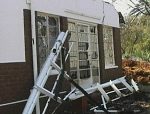 |
|
| |
|
|
 |
|
A
report on the ZBC Web site described VOP as a
"pirate radio station", which "churns
out anti-Zimbabwe propaganda from Europe."
The government is quoted as describing VOP as
"nothing short of a criminal and terrorist
group." The Minister of State for
Information and Publicity in the Office of the
President, Professor Jonathan Moyo, said the
setting up of the Voice of the People was an
example of European interference in Zimbabwe's
affairs. |
| |
|
|
 |
|
Zimbabwe's
government clamped down on domestic dissent when,
after fire-bombing of an independent radio
production company’s offices, police raided
the Amani-Trust,
a charity for torture victims and arrested its
doctor. Soldiers also held about 20 displaced
farmworkers who were building a camp outside
Harare for a local charity to accommodate
hundreds of other labourers forced from their
homes by President Mugabe’s seizures of
white-owned land. The three developments came
three days after Mr Mugabe swore in on 26.08.02
what he called 'a political and economic war
cabinet'. |
|
Drei Tage nach der Einrichtung
eines "Kriegs-Kabinetts" durch Präsident
Mugabe sind in Simbabwe Andersdenkende Ziel eines Bomben-Anschlags
und Opfer einer Verhaftungswelle geworden. Nach der
Sprengung einer Radioproduktionsstätte in Harare ging
Polizei in Harare gegen den Amani-Trust vor. Der
Trust kümmerte sich um Opfer politischer Gewalt in
Simbabwe; eine Ärztin, die Folter-Opfer behandelte,
wurde verhaftet. Soldaten stürmten am Stadtrand ein
Lager, das durch eine lokale Hilfsorganisation für die
Familien von Landarbeitern errichtet wurde, die durch das
Landnahme-Programm der Mugabe-Regierung von Farmen
vertrieben wurden, die Weissen gehörten. |
| |
| |
| 21.08.02 |
 |
Goverment turns
back Foreigners
Regierung
verweigert Ausländern Einreise |
|
| |
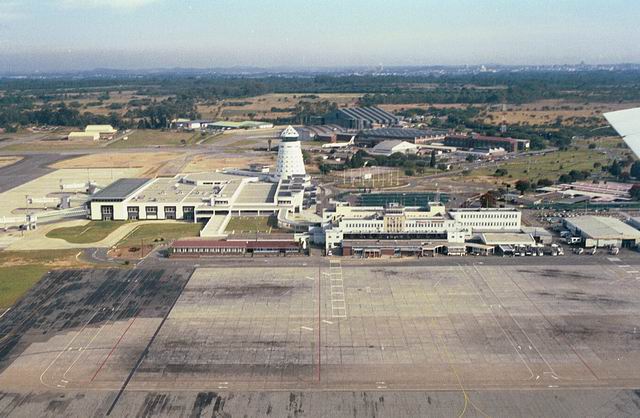
New
Harare Airport |
|
Die
simbabwische Regierung verweigert seit einigen
Tagen europäischen und amerikanischen Staatsbürgern
die Einreise ins Land. Auch zwei deutsche
Touristen waren betroffen.

Four British citizens have recently been refused
entry to Zimbabwe, the Foreign Office has
confirmed. The first two incidents happened on 8
August, followed by another on 11 August and the
most recent on 15 August.
 |
| |
|
|
| "Flying into
Zimbabwe is a pleasant new experience with the
opening of the striking new Harare International
Airport. The spacious new international terminal
is linked to the old one, which will be
completely refurbished and converted into a
domestic terminal." |
|
|
|
| |
| |
| 19.08.02 |
|
|
| |
| The Zimbabwe Government has
urged black settlers to begin working on land
being left by white farmers. The call comes as
many white farmers, who were arrested for
refusing to give up their land, pack their bags
as part of bail conditions which order them off
the farms. Around 2,900 white farmers had to
leave their land by 8 August but most of them
stayed put, risking fines and jail terms of up to
two years. In
Simbabwe hat die Polizei nach Angaben des
Farmerverbandes JAG in den vergangenen Tagen 130
weiße Großgrundbesitzer wegen der Weigerung
verhaftet, ihre Höfe für schwarze Bauern zu räumen.
38 von ihnen wurden dem Gericht vorgeführt und
nach Zahlung einer Kaution wieder auf freien Fuß
gesetzt. Nach Einschätzung des Farmerverbandes dürfte
sich die Zahl der Festgenommenen in den kommenden
Tagen weiter erhöhen. Die offizielle Frist zur Räumung
der Anwesen war Mitte August abgelaufen.
|
|



|
| |
|
|
 |
|
Zimbabwe's
first lady, Grace Mugabe, has chosen the white-owned
farm she wants and has ordered its elderly owners
and residents off the land. Mrs Mugabe has picked
the Iron Mask Estate, 30 miles north west of
Harare, which belongs to John and Eva Matthews,
both in their seventies.
Präsidentengattin Grace
Mugabe wird eine Farm übernehmen, deren weiße
Besitzer, ein Ehepaar in den Siebzigern,
gezwungen wurde, das Land aufzugeben. |
| |
|
|
 |
|
Arrested
Farmers Status
Who
Got Which Farm? |
| |
|
|
 |
|
<
Who owns the land? |
| |
|
|
 |
|
<
The Position of the Zimbabwe Government |
| |
|
|
 |
|
<
Hintergrund der Landreform |
| |
|
|
 |
|
<
Le Monde diplomatique, 17.5.2002 |
|
| |
| |
| 09.08.02 |
|
|
| |
|

 Nach
Recherchen der "Londoner TIMES" mag
sich Simbabwes Präsident Mugabe gezwungen sehen,
bestes Land, das weissen Bauern weggenommen wird,
zur Bezahlung von Erdöl-Lieferungen aus Libyen
zu verwenden. Wenige Stunden vor Ablauf des
Ultimatums für rund 2.900 Farmer, ihr Land zu
verlassen, seien aus diplomatischen Quellen
Einzelheiten eines bizarren Vertrages bekannt
geworden, wonach Mugabe soviel für das
importierte Erdöl schuldet, dass er bereit sei,
seinem "Freund" Gaddafi tausende von
Hektar zu übereignen, um an der Macht zu bleiben. Nach
Recherchen der "Londoner TIMES" mag
sich Simbabwes Präsident Mugabe gezwungen sehen,
bestes Land, das weissen Bauern weggenommen wird,
zur Bezahlung von Erdöl-Lieferungen aus Libyen
zu verwenden. Wenige Stunden vor Ablauf des
Ultimatums für rund 2.900 Farmer, ihr Land zu
verlassen, seien aus diplomatischen Quellen
Einzelheiten eines bizarren Vertrages bekannt
geworden, wonach Mugabe soviel für das
importierte Erdöl schuldet, dass er bereit sei,
seinem "Freund" Gaddafi tausende von
Hektar zu übereignen, um an der Macht zu bleiben.
|
| |
| The
Libyan leader, with his ambition of
becoming a pan-African leader, has been
engaged in acquiring substantial assets
in Zimbabwe for some time. The Times
reported earlier this year that Colonel
Gaddafi had acquired a significant
shareholding in Noczim, Zimbabwe's state-owned
energy company. He was also given a
controlling interest in the oil pipeline
that runs to Zimbabwe from Beira in
Mozambique and in two of the country's
biggest oil refineries. Colonel Gaddafi
had also made it clear that he wanted
shares in a state-owned hotel at Victoria
Falls and the Sheraton Hotel in Harare,
the capital, The Times reported. He was
also understood to have presented a gift
of £1.3 million to Mr Mugabe's Zanu PF
party, even though there was supposed to
be a ban on any political party receiving
foreign donations. Mr Mugabe was alleged
to have given 10,000 Zimbabwean passports
to Libyan citizens, making it easier for
them to travel abroad. Up to 1,500
Libyans were said to have been given
homes, work permits and jobs in Zimbabwe.
The diplomatic sources said that the
Libyan leader's wholesale asset-grabbing
in Zimbabwe was part of his dream of
spreading his personal power and
influence in Africa. |
|
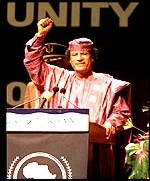
Der
libysche Führer, der sich als
panafrikanischer Führer profilieren möchte,
hat schon seit längerer Zeit beträchtliches
Eigentum in Simbabwe erworben. Dazu gehören
strategische Erdöl-Einrichtungen und
Hotel-Ketten. Präsident Mugabe soll 10.000
Libyern simbabwesche Pässe zur Verfügung
gestellt haben. |
|
|
| |
 |
|
ZIMBABWE
and Libya are deadlocked over demands by Tripoli
that it takes over Harare's entire beef quota to
the European Union (EU) and gets compensated with
goods such as unprocessed tea as part of the US$360
million oil-for-goods deal struck between the two
countries, government sources said this week. |
| |
|
|
 |
|
Libyan
leader Col. Muammar Gadhafi, in an ultimate
expression of the pan-Africanism he holds so
dear, is driving from South Africa back to Libya.
It is a journey that began on July 10, after the
launch of the African Union in Durban, South
Africa. But ever conscious about his security,
Gadhafi is travelling in a heavily armed convoy,
with bodyguards armed with at least 28 sub
machine guns and 40 pistols, according to South
African security officials. |
| |
|
|
 |
|
The
South African president, Thabo Mbeki, was the
official host and chairman of the inaugural
summit of the African Union (AU) in Durban
earlier this month. But the leader who stole the
limelight in the South African Indian Ocean port
city was undoubtedly Libya’s Muammar al-Gaddafi.
|
|
| |
| |
| 16.07.02 |
|
|
| |
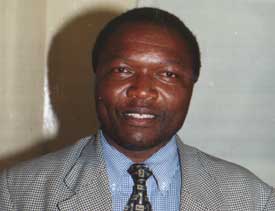
Contacted
for comment, war veterans secretary-general, Andy
Mhlanga, denied that some members of his
association were defecting from Zanu PF. "I
don't know about that. I am hearing it for the
first time, maybe it's being done behind the back
of our executive. The true war veterans remain
loyal to Zanu PF and President Mugabe because we
fought the liberation war together. It is a
marriage for life.
Der Generalsekretär der
Kriegsveteranen-Vereinigung, Andy Mhlanga, hat
auf Nachfrage erklärt, er höre zum ersten Mal
davon, dass Mitglieder sich von Zanu PF
abwendeten. "Die wahren Kriegsveteranen
bleiben loyal mit Zanu PF und Präsident Mugabe,"
sagte er. "Wir haben zusammen im
Befreiungskampf gefochten, das ist eine Ehe für's
Leben." |
|
WAR veterans,
disillusioned with the land seizure exercise
which has seen top government officials reap huge
benefits, have decided to break away from Zanu PF
and form their own political party, the New
People's Party (NPP). This break with President
Robert Mugabe's ruling Zanu (PF) party is being
seen as a move that if carried through could deal
a mortal blow to the 78-yearold's iron hold on
power.


Kriegsveteranen, die führenden
Regierungsmitgliedern vorwerfen, sich bei der
Landumverteilung in Simbabwe zu bereichern, haben
sich von der regierenden Zanu PF abgewendet, um
eine eigene Partei zu gründen. Dies könnte nach
Einschätzung politischer Beobachter im südlichen
Afrika dem Regime des 78 Jahre alten Robert
Mugabe den Todesstoß versetzen. |
| |
|
|
Source:
BBC, Tuesday, 20 February, 2001
The Other Side of the Story
as told by...
Die andere Seite der
Geschichte, erzählt von...
The Zimbabwe Liberators'
Platform (ZLP) was formed in protest at the
anarchy that accompanied the farm invasions which
were supposedly led by former freedom fighters.
The ZLP dismisses veterans as cowards for
attacking unarmed civilians during peacetime.
"There was a song that we used to sing in
the war, that a people's soldier should by no
means go out and beat civilians," recalls
Bernard Manyadza, who was one of the top
commanders of Mr Mugabe's Zanla army during the
independence war.
"We're surprised that the war vets are being
trafficked to suppress political opposition by
force,'' he said. ''They've turned from
liberators to oppressors of the people they're
supposed to have liberated."
The ZLP's opposition to Mr Mugabe and his right
to speak for the veterans has its roots in the
war of independence.
At the time fighters from the Zanu and Zapu
liberation movements initiated the formation of a
joint Zipa army.
They believed the politicians were tired of the
war, so they wanted to re-start the armed
struggle themselves; and they wanted national
unity at all costs, so as to avoid the kind of
civil war that followed Angola's independence.
They won the backing of the neighbouring
frontline states' leaders, especially President
Samora Machel of Mozambique who allowed them to
fight from his country. But clashes soon occurred
in the Zipa camps between cadres of the two
liberation movements.
Mr Mhanda and his comrades from Zanu were
convinced that their lack of political leadership
was contributing to the tensions in the united
army.
President Machel asked them to draw up a list of
10 names of potential leaders. At the top of
their list was Robert Mugabe, who was then under
house arrest in Mozambique because Mr Machel was
hostile to his anti-unity sentiments. Reluctantly
Mr Machel agreed to release Mr Mugabe, and that
is how he came to lead Zanu and later Zimbabwe.
The fighters soon grew disillusioned with Mr
Mugabe, but by then it was too late because he'd
secured the backing of Mr Machel.
In order to gain control of the army and prepare
the way for negotiations with the Rhodesians, Mr
Mugabe persuaded Mr Machel to allow him to detain
his own men, claiming they were plotting against
his leadership.
Mr Manyadza and Wilfrid Mhanda, a senior officer
under Mr Mugabe and now the ZLP spokesman, were
among the 50 top commanders arrested. Later
hundreds more junior soldiers were arrested.
The two were kept in cells in terrible conditions
for the first six months - packed in the dark,
with no toilet. For the last two-and-a-half years
of the war they were held in a detention camp.
'Mr Mhanda recalls the words of a Holocaust
survivor to describe their ordeal: "He who
has not experienced it cannot believe it; he who
has experienced it cannot understand it."
The so-called dissidents, who were never charged
with any offence, have waited 20 years for the
whole truth to come out.
"Probably we could have forgiven without
forgetting, but the events of the last year
forced us to regroup," says Mr Mhanda.
"He did it to us but he has no right to do
it to the country." |
|
ZLP spokesman
Wilfrid Mhanda
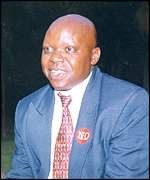
Die
Anarchie bei Farmbesetzungen durch angebliche
ehemalige Freiheitskämpfer führte schon im Jahr
2000 zur Bildung einer Organisation von
Kriegsveteranen. Sie nannten die Farmbesetzer
"Feiglinge", die sich von Freiheitskämpfern
zu Unterdrückern gewandelt hätten.
Die Opposition gegen Mugabe und seine Partei
begann während des Befreiungskampfes als Kämpfer
von ZANU und ZAPU sich zu einer gemeinsamen
Streitmacht vereinigt hatten. Deren Führer
warfen der alten Elite vor, kriegsmüde zu sein.
Sie wollten vor allem nationale Einheit und nicht
einen Bürgerkrieg wie er nach der Unabhängigkeit
in Angola ausgebrochen war.
Dafür erhielten sie die Unterstützung der
Frontlinien-Staaten; Präsident Samora Machel
erlaubte ihnen, von Mozambik aus den Kampf um die
Befreiung Rhodesiens weiter zu führen.
Doch in den Camps kam es zu Streitigkeiten
zwischen unterschiedlichen Fraktionen. Wilfrid
Mhanda und seine Kameraden aus der ZANU machten
das Fehlen poltischer Führung dafür
verantwortlich. Machel bat sie, zehn Namen
potentieller neuer Füher aufzuschreiben. Ihre
erste Wahl war Robert Mugabe, der in Mozambik
unter Hausarrest gestellt war, weil Machel ihn
beschuldigte, die erforderliche Einigkeit zu
sabotieren. Auf Machels Weisung wurde Mugabe
freigelassen, so wurde er Führer der ZANU und später
Simbabwes.
Die Freiheitskämpfer, die ihn an die Spitze
geholt hatten, waren bald desillusioniert, aber
Mugabe konnte Machel überzeugen, sich seinem Weg
zu Verhandlungen mit dem rhodesischen Regime
anzuschliessen. Ihm wurde erlaubt, all jene in
Haft zu nehmen, denen er vorwarf, ihn stürzen zu
wollen.
Wilfrid Mhanda war einer der leitenden Offiziere
unter Mugabe. Zusammen mit 50 Kommandeuren und später
vielen hundert Soldaten wurde er verhaftet und
unter unmenschlichen Bedingungen in einer Zelle
festgehalten. Die letzten zweieinhalb Jahre vor
Kriegsende war er in einem Gefangenenlager.
Mit den Worten eines Überlebenden des Holocaust
sagt Mhanda über seine Erfahrung: "Der, der
es nicht erlebt hat, kann es nicht glauben; der,
der es durchgemacht hat, kann es nicht verstehen."
20 Jahre haben die sogenannten Dissidenten darauf
gewartet, dass die Wahrheit ans Licht kommt.
"Vielleicht hätten wir vergeben können,
ohne zu vergessen. Aber die Ereignisse des
letzten Jahres zwangen uns, umzudenken,"
sagt Mhanda. "Er hat das uns angetan, aber
er hat kein Recht, es dem Lande anzutun." |
|
| |
|
|
| |
| |
| |
| 25.06.02 |
05.04.02:
Human rights group Zimbabwe in
Crisis appealed for urgent assistance on Friday for at
least 50,000 people who it says have been displaced by
political violence and land seizures
Die Menschenrechtsgruppe "Simbabwe
in der Krise" hat dringend zur Hilfe für mindestens
50.000 Menschen aufgerufen, die durch politische Gewalt
und Landnahme vertrieben wurden.
|
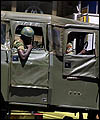
07.04.02:
Zimbabwe
police break up demos this weekend
 |
|
At least 22 people are reported to
have been arrested in a crackdown against anti-government
protests across Zimbabwe.
Die
simbabwesche Polizei hat am Wochenende Proteste gegen die
Regierung aufgelöst und mindestens 22 Teilnehmer
festgenommen. |
| |
|
|
|
Simbabwes Präsident kontrolliert
einen mächtigen Partei-Konzern, dessen Verflechtungen
weit über die Landesgrenzen reichen

Robert Mugabes Milliarden-Imperium
|
Zimbabwe's
main opposition party went to court to try to overturn
the results of last month's controversial presidential
election.
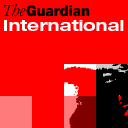
|
|
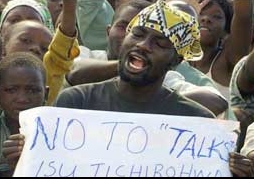
Simbabwes MDC-Opposition hat beantragt, die Ergebnisse
der kontroversen Präsidentschaftswahlen vom März
gerichtlich für ungültig zu erklären. |
| |
|
|
|
Die
Gewaltherrschaft von Präsident Mugabe hat Simbabwe an
den Rand des Ruins getrieben. ARD-Korrespondent Stefan
Schaaf beschreibt die Auswirkungen der brutalen
Landreform, die Einschränkung der Pressefreiheit und die
Willkürtaten Mugabes.
|


|
|
The
children of destitute opposition supporters in Zimbabwe
are being refused food aid in the latest round of
reprisals after Robert Mugabe's disputed election victory
last month. Pro-government thugs are driving children
from feeding centres in drought-hit areas because their
parents are suspected of supporting the Movement for
Democratic Change (MDC). |
| |
|
|
|
Marking Independence Day on April
18th with a speech to thousands in Harare, President
Mugabe said, "the white man is
a second citizen, you are number one, he is number two or
three now - and that must be taught to our children".
|
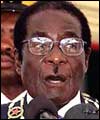
 |
|
Zum
Unabhängigkeitstag Simbabwes am 18. April hat Präsident
Mugabe in einer Rede vor einigen tausend Anhängern erklärt,
"der weisse Mann ist Bürger zweiter Klasse, ihr
seid Nummer eins, er ist jetzt Nummer zwei oder drei, und
das muss unseren Kindern beigebracht werden". |


